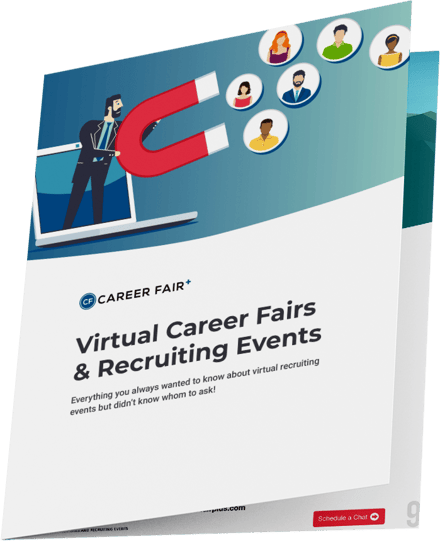
In his call to Abolish Career Services, Ryan Craig tells us the rise of career services management systems (CSMs), especially Symplicity and Handshake, has reduced campus-based career services departments to nothing but theater. He insists the career services function is merely a show--one that's helped rationalize the end of on-campus recruiting.
Career Fair Plus (CF+) works directly with career services professionals year-round. We transformed our on-site recruiting software into an online hosting platform to facilitate the unexpected in 2020. We also revitalized the in-person features to incorporate data-driven insights when the percentage of in-person college career fairs soared by nearly nine-fold" during the 2021-22 academic year.
Whether using a CSM or not, these career services departments are an essential and relevant link between employers and students. Here's why.
An imagined problem?
Citing a recent Inside Higher Education and Kaplan survey of over 2,000 students, Craig spotlights that only 280 respondents (14%) were happy with career services. However, reading the complete findings in context reveals students weren't so unhappy, either.
In fact, 56% of students reported being happy with career services compared to other non-academic departments. However, respondents were also more dissatisfied with 14 other university departments than career services, including financial aid, the registrar, the bursar, counseling, and residential life.
Only 4% had difficulty connecting with their career center. When asked from which departments or offices on their college campus they received bad customer service, only 40 (2%) mentioned career services. Finally, 33% said career services would always need staff for students to meet face-to-face.
So, before we defund supposedly irrelevant career services, let’s talk about what those wanting to shut them down are missing.
Why career services are essential and relevant
Craig’s call to abandon campus-based career services ignores these professionals' vital contributions to the students, their institutions, and the economy.
Strong relationships with students can influence positive post-graduate interactions. Happily employed alumni are more likely to “be true to their school,” by raising brand awareness, encouraging applications, and donating to capital campaigns.
Beyond the campus
A competent workforce is foundational to a strong economy; universities and colleges are a primary source of qualified employees for local, regional, and national employers. The career services teams are the conduit between the two.
Dual purpose
Career services give students a competitive edge in their job searches and the university a competitive advantage in fundraising. A recent Franklin Covey article quoting Forbes explained the critical role career services departments play in both students’ career development and brand building,
Graduates who rate their experiences with career services as ‘very helpful’ are 5.8x more likely to strongly agree their alma mater prepared them for post-collegiate life, nearly 3x more likely to strongly agree their education was worth the cost, and 3.4x more likely to recommend their alma mater.
Moreover, graduates who have a positive experience with their career development office are almost 3x more likely to make a financial donation to their college or university after they graduate.
U.S. News reported, “Students who had a good experience with career services at college were more likely to say their school prepared them well for life and more likely to think their university was worth the cost.”
What CSM technology can’t do
Man (or woman) vs. machine is a classic conflict. Craig seems convinced CSM technology can replace career services departments. As a software engineer with a recruiting background and a co-founder of a SaaS company, I wholeheartedly disagree. (I’m also not convinced that the faculty will accept the additional work he suggests assigning them, but more on that later.)
People excel at solving uniquely human challenges
Unlike software platforms, career services teams can personally coach and guide individuals around employment barriers. For example, introverts, first-generation college students, and minorities often start their job searches behind the curve; they often lack generational networks, role models, or access.
Career teams help at-risk and high-performing populations. They explain various job paths for one’s major or assist with complicated application processes. And they empathetically coach students to discuss career choices vs. family expectations. Handshake and Symplicity have 100 job openings, but these are words of wisdom or insights.
Career services that aren’t career-related
Abolishing career services means dropping or reassigning those tasks. Craig proposes the latter by making professors responsible for student-employer engagement—and presumably everything else originating in career services departments, including
-
Major and career advising
-
Aptitude assessments
-
Mock interviewing feedback
-
Workshops and speakers
-
Resume and cover letter guidance
-
Professional profiles for social media accounts
-
Graduate school planning
-
Job and internship referrals
-
Objective advice
I want to pause here and ask a question: Which of your college professors, either while you were enrolled or later if you worked at a university or college, can you imagine adding any of the above tasks to their faculty job requirements?
Professors aren’t career coaches
I also disagree with Craig’s declaration that Handshake’s success reveals “we desperately need [to abolish] career services" and reassign their tasks to professors. Yes, students see the students in their courses two or three times a week, but those aren’t one-on-one interactions. Yes, professors hold advanced degrees, but a PhD in history or chemistry doesn’t translate into career coaching. Or having the time to be a career coach.
Who has the time?
Full-time professors work 40 hours a week: teaching, holding office hours, attending meetings, participating in campus activities, and advising clubs or academic groups. They’re also conducting research, publishing results, securing grants, completing continuing education, and designing curricula.
Which of these tasks should university administrators delete from faculty job descriptions? After all, they’ll need time for “making connections between course performance and career opportunities, advising students, and building and maintaining field-specific employer networks,” as Craig recommends.
Not professors
Colleen Flaherty reports on Inside Higher Ed's 2022 Survey of College and University Chief Academic Officers that 79% of provosts say their faculty are leaving at significantly or somewhat higher rates than in the past.
Burnout, relentless 70+ hour work weeks, zero work-life balance, and devaluing faculty are some of the reasons for unprecedented attrition. Economist Jadrian Wooten changed universities before his per-term student load went from approximately 850 before 2020 to a projected 1,300 post-COVID.
Where’s the wisdom in demanding professors on the verge of quitting add ‘career services advisor’ to their job requirements?
What’s the alternative?
And what if professors want to be professors instead of professors + career services staff? According to Craig, “...faculty unwilling to stretch should consider switching to a profession that doesn't involve interacting with students whose primary concern is employment; try teaching elementary school.”
According to Career Fair Plus, the better alternative is a new, career services and student-focused CSM.
A better way forward
According to a Gallup poll, college graduates who visit their school’s career centers are more likely to obtain full-time jobs than students who do not use this service — 67% compared to 59%. They also report their jobs are more fulfilling. Career services departments matter.
So, to paraphrase Craig, Handshake’s success reveals the change we desperately need: an alternative to employer-driven CSMs. Something that raises the bar by focusing on career services and students instead of employers.
Technology like Handshake and Symplicity informs and manages initial connections; career services teams prepare students to maximize those opportunities.
Contrary to Craig’s seemingly all-or-nothing position, funding career services doesn’t negate university-wide support for students’ career development. For example, professors can still recommend internships or share network connections without adding career service metrics to their annual evaluations.
Campus-based recruiting needs software that rewards career services teams and their budgets for their hard work preparing students to seize opportunities presented in CSMs and at career fairs.
